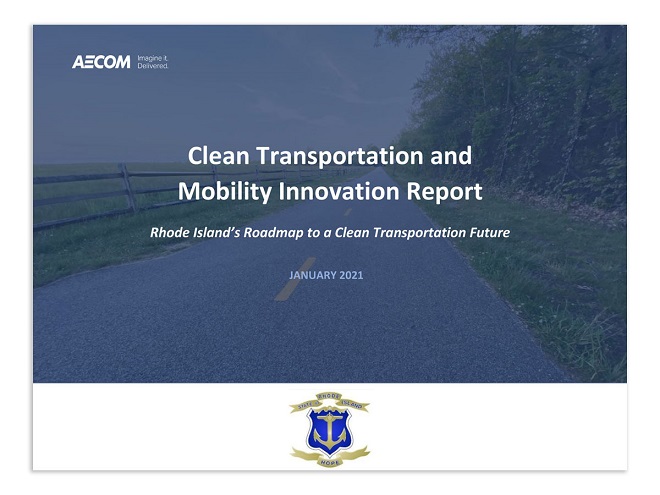REPORT, RECOMMENDATIONS TO REDUCE GREENHOUSE GAS EMISSIONS AND MAXIMIZE CLEAN MOBILITY OPTIONS RELEASED

PROVIDENCE – The Department of Environmental Management (DEM) announced today that the Mobility Innovation Working Group has issued its final report. The report includes recommendations to reduce greenhouse gas emissions and maximize clean mobility options for all Rhode Islanders. Approximately 40% of Rhode Island’s greenhouse gas emissions are generated from the transportation sector.
Members of the Working Group, including representatives from DEM, the Department of Transportation, Office of Energy Resources, Division of Statewide Planning, and stakeholders, have collaborated over the past five months to develop a statewide mobility strategy that builds on the state’s existing clean transportation policies, regulations, and initiatives to further transportation options and promote economic development.
“The Working Group members feel the greatest contribution we can make is to encourage action and we feel confident that this report provides an ambitious and actionable framework,” said Chairperson Colleen Quinn, who has worked for more than a decade as a pioneer and thought leader in the clean transportation sector. “We look forward to continued collaboration as we set Rhode Island on the path to a clean transportation future, one that promotes green economic development and ensures equitable benefits for all Rhode Islanders. “
The Working Group conducted a series of public meetings and sought input from a wide range of experts that spoke to the future of transportation and the importance of equitable policy in transportation and climate. The Group also heard from local and national organizations that advocated for policies and investments in clean transportation and mobility.
The final report highlights facts, trends, and issues that emphasize the impact of transportation emissions on climate change and the impact that climate change has on Rhode Islanders. Climate change is a clear and present threat to the lives and well-being of Rhode Islanders, and the state has several strategic advantages in taking action to mitigate the cause of climate change and prepare for the hazards expected to emerge over the coming decades.
Also, the report summarizes the Rhode Island mobility audit and state benchmarking. The state has engaged in numerous initiatives to promote clean transportation and improved mobility. The audit was an essential first step in developing recommendations to meet the state’s mobility goals and establishes the baseline for the state’s pursuit of its ambitious environmental, clean transportation, and equity vision.
In addition, the report summarizes and highlights three key areas of clean transportation investments. The portfolios were evaluated using an investment tool that translates dollar values into benefits including changes in vehicle-travel, greenhouse gas emissions reductions, air pollutant reductions, the value of health benefits, and economic benefits.
Lastly, the report includes recommendations and action steps including programmatic, legislative, and regulatory initiatives focused on developing accessible mobility options, reducing greenhouse gas emissions, and creating sustainable jobs. They are organized into six categories, as follows:
Create a healthier environment for all Rhode Islanders with specific benefits for residents of our most overburdened and underserved communities.
Establish Rhode Island as a nation-leader in bold transportation and climate commitments.
Modernize, expand, and invest in state transit and transportation assets to effectively move more people and improve accessibility.
Improve air quality by taking steps to electrify the transportation sector.
Create a 21stcentury mobility infrastructure that capitalizes on the emerging changes in transportation technology; and
Unlock economic opportunity, promote green job creation, and support business and supply chain industries.
The final report of the Mobility Innovation Working Group is available at
http://climatechange.ri.gov/state-actions/mobility-innovation.php
